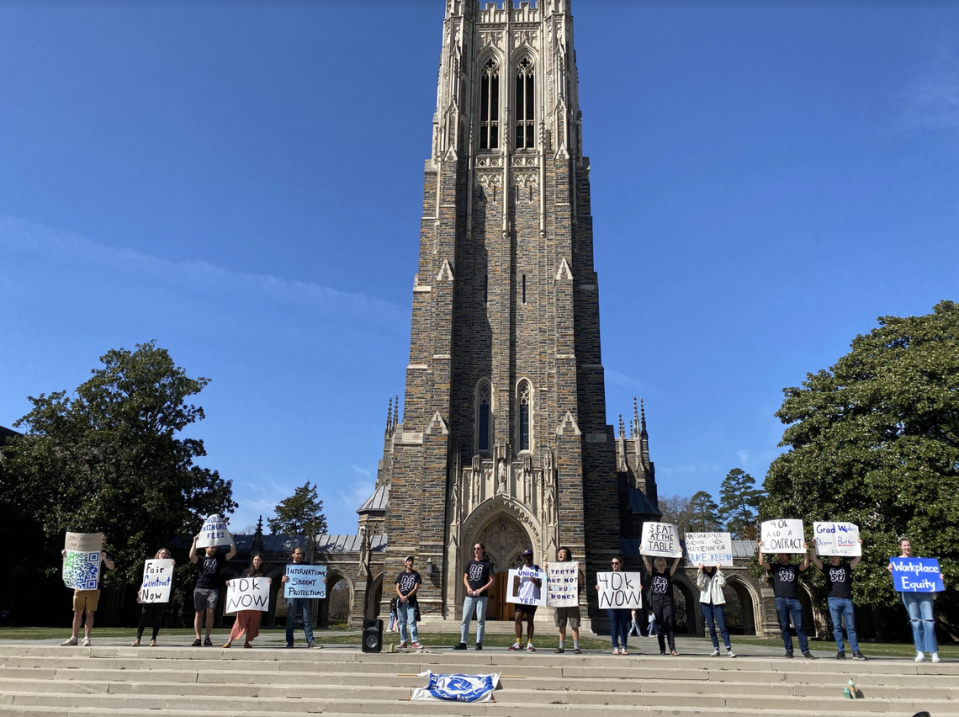Duke Ph.D. students will form union after resounding election victory. What comes next.
Doctoral students at Duke University overwhelming voted to unionize Tuesday, giving 2,500 academic employees at the prestigious Durham school the right to have their pay and working conditions collectively bargained.
Ballots in the mail-in election heavily favored the union, with 1,000 votes in support to 131 votes against.
Duke Ph.D. students, who commonly work as teaching and research assistants, will be represented by the Service Employees International Union. Once certified, the new union will be one the largest in North Carolina and one of the only representing graduate students in the South.
“WE WON OUR UNION,” wrote the Duke Graduate Students Union (DGSU) on X, formerly Twitter, minutes after the final tally was announced.
North Carolina has the second lowest unionization rate in the country, with only 2.8% of workers in unions according to the U.S. Bureau of Labor Statistics. Because it is a Right-to-Work state, Duke doctoral students can choose whether to pay dues if they choose to not join the union.
Pay was a prominent issue in the months-long union campaign.
with Duke Graduate Students Union (DGSU) spearheading
Duke Ph.D. students do not owe tuition and receive a 12-month stipend of $38,600. This is a few hundred dollars above the local minimum living wage, which the City of Durham calculates to be $38,400 a year for a 40-hour work week.
A higher stipend isn’t the only benefit the union can deliver, said RP Pornmongkolsuk, a third-year Duke doctoral student studying genetics and genomics.
“A lot of times people don’t feel like there’s an established outlet for giving grievances,” he said. And as an international student, Pornmongkolsuk believes the union will support those who must navigate often-byzantine visa application programs.
“Having that immediate support is going to help a lot of grad students here,” he said.
Second union attempt at Duke
This was the second attempt to organize Ph.D. students at Duke; a previous bid to have Duke academic workers join the SEIU fell significantly short in 2017.
Since then, more doctoral student workforces have embraced unions, often by wide margins, including at Boston University, Yale University, and the University of Southern California. Kickstarting this trend was a 2016 National Labor Relations Board ruling clarified that research and teaching assistants at private universities could formally organize.
“You have an age demographic of employees who are already primed to unionize,” said Jeff Hirsch, a labor law professor at the UNC School of Law. “There’s an upsurge of interest in unions, particularly with the kind of 20-something crowd that we’re seeing with Starbucks and all kinds of post-pandemic changes in the labor market.”
This year’s union campaign at Duke formally launched in early March.

Later that month, Duke challenged its graduate students’ right to form a union, contending they were not employees. The NLRB rejected that argument in July, setting the stage for the mail-in vote.
Next comes a first contract ... eventually
With the election campaign concluded, union and university leaders will now turn to negotiating a first contract.
“An election win is a very important step, but it is just one step,” Hirsch said. “It’s not even near the end of the process.”
In an analysis last year, Bloomberg Law found 465 days lapsed on average between an election and a first contract.
Duke University could begin bargaining with the union at any time. But the school can also take steps that protract the process — perhaps by years. Hirsch explained there are multiple opportunities for the school administration to challenge the election results or the union’s right to represent the 2,500 academic employees.
For a workforce that graduates members annually, Hirsch said it will be essential for SEIU to maintain interest in their union through the first contract and beyond.

